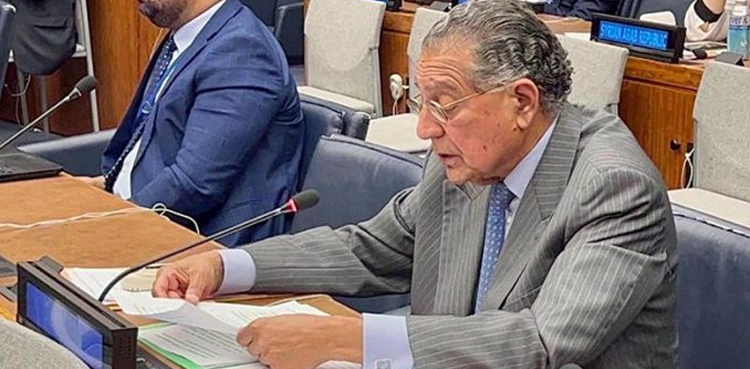Veto responsible for non-resolution of Kashmir, Palestine issues: Munir Akram

UNITED NATIONS: Pakistan has told the UN General Assembly that it considers the veto power vested in the Security Council’s five permanent members an important issue that needed to be tacked as part of the 15-member Council’s reform to make it more effective.
Speaking in a debate marking the first anniversary of the 193-nation Assembly’s landmark resolution that requires the permanent members — Britain, China, France, Russia and the U.S. — to justify the use of veto, Ambassador Munir Akram said the Security Council has been paralyzed by the strategic rivalries of its permanent members and the exercise of the veto.
“It is precisely for this reason that longstanding disputes such as Kashmir and Palestine could not be resolved,” the Pakistani envoy said, adding that the vetoes in the Council have prevented and hindered the implementation of UN resolutions.
“The final resolution of the issue of the veto will have to be resolved – not separately – but as an integral part of the reform of the Security Council,” he added.
The 2022 Assembly’s resolution, adopted by consensus, calls for the General Assembly to automatically meet within 10 days if any of the five permanent members uses their right of veto, the state news agency reported.
The aim is to hold those countries accountable for exercising this special voting power, which allows them to block any Council resolution or decision.
This right is enshrined in the UN Charter, the Organization’s founding document, because of their key roles in establishing the global body more than seven decades ago.
All five have exercised the right of veto at one time or another, with 44 vetoes alone since the year 2000.
In his remarks, Ambassador Akram said that experience has confirmed that the abolition or restraint on the misuse of the veto rights of the permanent members will have to be an integral part of the Security Council’s reform, pointing out that it was for this reason that Pakistan – together with the UfC (Uniting for Consensus) Group – remains opposed to the creation of new permanent members on an expanded Security Council.
“More permanent members and more veto powers will multiply the likelihood of paralysis and inaction in the Security Council,” the Pakistani envoy told the General Assembly.
Progress towards restructuring the Security Council remains blocked as the so-called Group of Four — India, brazil, Germany and Japan — continue pushing for permanent seats, while the Italy/Pakistan-led Uniting for Consensus (UfC) group opposes any additional permanent members.
As a compromise, UfC has proposed a new category of members — not permanent members — with a longer duration in terms and a possibility to get re-elected.
Besides the five permanent members, the Security Council has 10 non-permanent members elected to two-year terms.
Noting the negative power of the veto, Ambassador Akram said this can be “balanced” by, on the one hand, placing restrictions on the use of the veto, and, on the other, enhancing the role of non-permanent members through larger and perhaps longer representation.
At the same time, the Pakistani envoy said that any measures to restrict or constrain the veto must be in line with the rules of the Charter.
Pakistan, he said, remains convinced that the IGN (Inter-governmental Negotiations) process offers the best avenue to reach an agreed outcome on the Council’s reform.
“It is only through patient exchanges, mutual accommodation, and compromises that we can broaden the areas of convergence and reduce the points of divergence and thus evolve a ‘model’ for the reform that can be accepted by the widest possible majority of member states.”
In his opening remarks, General Assembly President Csaba Korosi said “The issue of the use of the veto affects the whole UN. And the decisions taken in these halls – or the lack of decisions – reverberate world-wide,” adding that “vetoes should always remain the very last resort.”
He said this first-ever formal debate on the veto initiative was being held “to figure out the best ways to exploit this new instrument in our big UN toolbox.”
He urged ambassadors to “ask tough questions” and “seek game-changing solutions”, stressing that “there is no wrong answer, only new ideas.”
Korosi also expressed hope that Security Council members can unite and work for viable solutions, going beyond their immediate interests to act responsibly for the sake of peace across the world.
“That way we will never have to fall back on the veto resolution,” he said. “Because, in my view, it is like an oxygen mask in an airplane: good to have, but best never to be used.”
The General Assembly President said he intends to send the verbatim records of the debate, and all future debates, to the Council President.
“Today’s exchange of views cannot be just a pro forma event, or a mere administrative procedure,” he said.
“This is an opportunity to chart new avenues for multilateralism and cooperation. An opportunity to rebuild trust both within our institution and in it. An opportunity to do better for the eight billion who count on us.”
from Latest Pakistan News Breaking News from All over Pakistan - ARY News https://ift.tt/0UmGksV
Comments
Post a Comment